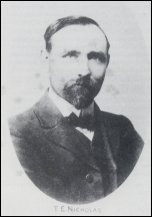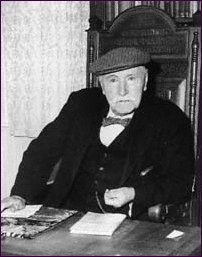T. E. NICHOLAS
'NICHOLAS OF GLAIS'
(1879 – 1971)
SEVEN PRISON SONNETST E Nicholas was simultaneously one of the most extraordinary yet also typical voices in the literary, political and religious life of twentieth century Wales. As his biographer David W Howell of the University of Wales, Swansea, comments:
"T. E. Nicholas was one of the great 'characters' of twentieth-century Wales. From his boyhood days spent on the lovely Preseli hills of Pembrokeshire, down to the end of his life, he was a radical, a thorn in the flesh of the political and religious establishment, employing his considerable literary talents and oratorical gifts, expressed in his native Welsh tongue, in championing the downtrodden Welsh worker in both the industrial valleys of South Wales and the rural hamlets and villages of Cardiganshire and North Pembrokeshire. Much of the shaping of this impressive man's outlook took place while serving as a Minister of the Gospel at Glais between 1904 and 1914: it was here that he gained a reputation for holding revolutionary views and for speaking out for the disadvantaged in society."
(David W Howell: Nicholas of Glais: The People's Champion, Clydach Historical Society,1991, Booklet, 49 pp)
Before his ministry at Glais he spent three years in Ammanford studying at the Gwynfryn Academy on College Street (the street itself is named after the College). In later years Nicholas himself reiterated how important this phase of his long life had been (he died in 1971 at the age of 91):
"Around the turn of this century he decided to enter the ministry and he received his three-year training for this at the Gwynfryn Academy, Ammanford, under Watcyn Wyn (Watkin Hezekiah Williams) and Gwili (John Jenkins). He was to claim in the twilight of his life that he hadn't seen any new developments in theology since his instruction under those two 'great men', that the religion of the New Testament is for the uneducated man and that Watcyn Wyn had opened his eyes to how excellent the simple doctrine of the Gospels really was."
(David W Howell: Nicholas of Glais: The People's Champion, Clydach Historical Society,1991, Booklet, 49 pp)
Although he moved away from Ammanford after his days at Gwynfryn he continued to return to the area for the purpose of public speaking engagements, including visits to the 'White House', a centre for young radical coal miners from 1913 to 1922. (see 'The White House' in the 'History' section of this website).
As we have seen elsewhere in this web site (Nicholas of Glais: Pacifist, Christian, Socialist), T E Nicholas spent four months in prison from the 11th July 1940 for his anti-war beliefs, whose son Thomas Islwyn Nicholas (1903 – 1980), was also imprisoned for the same period. During that time he wrote and later published about 150 prison sonnets. An idea of their quality can be gained from seven of these which are translated below, with due allowance made hopefully for the translators' shortcomings. Of his anti-war activities, Professor David W. Howell of the University of Wales, Swansea, writes:
From 1934 to 1939 his was the loudest voice in the public life of Wales, condemning Fascism in Germany, Spain and elsewhere. The Spanish Civil war, 1936-38 gave rise to his sonnets denouncing Fascism there and these helped to rouse the sympathy of the Welsh people for the Spanish Republic. October 1938 saw him speak at a meeting in Glamorgan, chaired by the general secretary of the South Wales miners, Dai Francis, commemorating the death of a south Wales miner in the Spanish Civil War. Back home in Aberystwyth, he wrote to Dai Francis enclosing a sonnet in memory of the 'Welsh Comrade' who fell in Spain and pledging that he would see to it that a memorial would later be set up for the gallant Welshmen who died in Spain. He was true to his word, for he with others organized a memorial tablet in the Stalingrad Hospital to the memory of those Welsh members of the International Brigade who fell in Spain. His antifascist views were also strongly in evidence from the mid-thirties in his detestation of Hitler's Germany.
..... Resuming his earlier role as a political journalist, his weekly articles to the Welsh newspaper 'Y Cymro' from 1937 impressed upon his readers the danger of a Second World War arising out of Fascist aggression and Britain's policy of appeasement. He was later to recall that the loneliest time of his life was at the time of 'the sell-out at Munich' when he knew it meant war. While the Nazi-Soviet Pact of friendship of August 1939 shocked the outside world, Nicholas, upsetting the editor of 'Y Cymro' and antagonising public opinion, expressed his support for it and opposed the war against Nazi Germany. Russia, he wrote, had acted in the interest of peace and in so doing was taking the path of the Gospel. As German invasion threatened, panic mounted and Nicholas fell victim to the witch-hunt against not only pro-German sympathisers but those on the political left and Welsh nationalists. The Cardiganshire police picked him up at Llanbrynmair on 11 July 1940. Back in Aberystwyth, he was exposed to the vengeful spite of the chief-constable determined to put him behind bars on account of his pro-Russian sympathies. On a trumped-up charge of Nicholas being a Fascist on account of his having at home a war map published in the Daily Express with German flags pinned on it simply to show the course of the war, both he and Islwyn were packed off first to Swansea prison and later transferred to Brixton. While behind bars, he wrote some one hundred and fifty sonnets expressing, in Daniel Hughes' words, his Christian-inspired 'deep and wide sympathy for suffering humanity'. A small incident in the gaol would furnish the starting point for a poem. Denied writing paper, he scribbled the sonnets on the slate in his cell and then wrote them out in ink on toilet paper, some of which were smuggled out of Swansea prison by a friendly prison officer. It was thanks to a protest raised by the Labour movement and the chapels on their behalf that Nicholas and Islwyn were released after four months of imprisonment. On 22 June 1941 Germany attacked Russia; this brought Nicholas welcome peace of mind and he spent the rest of the war backing the Russian war effort.(David W Howell: Nicholas of Glais: The People's Champion, Clydach Historical Society,1991, Booklet, 49 pp)
................. ......SEVEN PRISON SONNETS
.............................(TRANSLATIONS)........................TO A SPARROW
Here, take this other crumb for that bright singing,
And now a bit of apple to make it good;
Your constant pecking its own comfort bringing,
'Tis fine to see again your old grey hood.
You came perhaps from distant Dyfed's moorland
Where furze and heather climb great Frenni's height,
And on grey wing, perhaps, above some foreland
Of Ceredigion you have poured delight:
Come, take this bread; had I the wine as well
Pressed from the richest grapes of some far state,
Despite all wars, within this narrow cell
The blessed sacrament we'd celebrate:
The bread I swear is pure, for nothing mars
The offering of a heart that knows no bars.
.............................(Translation: Wil Ifan).AND WHEN YOU PRAY AND PRAY
And when you pray and pray I cannot listen,
Your silky hands, so steeped in blood, I dread,
From holy altar's, easeful shade I hasten
When on the upward steps I hear your tread.
You dress your mealy words in subtle clothing,
You bless the dogs of war with priestly cant,
I loathe you with an everlasting loathing,
Arch-hypocrite and royal sycophant.
Humanity in need can wait no longer,
And you like foolish mummer on bent knee –
The blood and fat of ox won't feed my hunger –
While untold corpses litter hill and lea.
Your paws are red with blood, you fleshy knave,
Who panting runs with beast of primal cave.
.............................(Translation: Meirion LLoyd)...................ONE NIGHT
I hear a humming on the brink of sleep,
Like that of bees 'mid leaves in summer heat,
And something distant ever closer creep,
Like thresher's whir and rasp among the wheat,
And soon deep thunder rolls across the skies,
The lightning bolt descends where folk reside,
And under the dictator's blows men's cries
Are heard, like soughing of the ceaseless tide.
The prison rocks like ship on ocean high,
And all of us for now in terror's sway;
The drone of metal birds around the sky
Recedes at last and slowly dies away.
I doze again, and in a warm July
I hear the bees among the fox gloves ply.
.............................(Translation: Meirion LLoyd).....................COUNSEL
"Why agonize about the people's plight,
It's only snub and scowl you'll get in battle's roar.
Be wise, take refuge from the tempest's might,
And put aside some milk and wine in store.
You'll earn the gentry's trust and high regard,
Your wife and child will not know indigence;
A pastor's tranquil life is scarcely hard,
An anchorage in circling turbulence."
"As well beseech the waves to shun the shore,
Implore the sun to keep in check its beams;
I am a child the nation's people bore,
For good or ill I am their son, it seems.
So long as the poor have a cross to bear,
Some part of it will rest on me, confrère."
.......................................(Translation: Meirion LLoyd)........................WISH
If I receive a choice of blessings now,
.....Too much to count, when they unlock this cell,
.....A palace mine, with money raining down,
.....And wealth beyond my dreams, to keep or sell,
I would refuse, and chose a day instead
.....Of autumn sun, to ruffle hazel leaves
.....And plunder nuts and berries from the hedge
.....Or from the hazel shell the kernel tease.
Then homeward after in each other's arms,
.....We'd talk of how we roamed these woods and farms,
.....And watch in silence ivy's autumn growth
.....From rock and wall draw out support and strength.
Where children with their toys play on the floor
Our dog's big laugh will greet us from the door.
.............................(Translation: Terry Norman)...................THE CELL
It's not an accident I'm in this cell:
.....For working for the poor that's how you're paid.
.....But after strife of war, all will be well,
.....With freedom from the grasp of fear and fate.
I sleep, despite the aeroplane's vile noise,
.....Spitting its madness out in sparks of fire:
.....When wrath of men descends from out the skies,
.....The sound of song can quell its fear and ire.
I did not make this monster now abroad,
.....Its talons gripped about the nation's towns,
.....Whom tens of millions worship as their lord,
.....Willing their god to send his vengeance down.
Though evil birds of judgement nearer fly,
The devil's power I'll face and will defy.
.............................(Translation: Terry Norman).........THE WORK OF THEIR HANDS
From deep within the earth, in rocks and caves,
.....My fellow workers dig the metal ore,
.....And bring it from afar through wind and waves,
.....And at the furnace purify it more.
The sound of wheels inside the factories
.....Is heard like stones of judgement grinding on;
.....The man who hammers at the anvil, sees
.....Materials flower into steel and iron,
And all his labour yielding at the last
.....The hundred thousand links that make a chain,
.....Unable to foresee it binding fast
.....A race enslaved and held by hoops of pain.
And so these men, though not my enemy,
Have made these fetters that imprison me.
.............................(Translation: Terry Norman)Translations made for this web site.
© www.ammanfordtown.org.uk 2003


